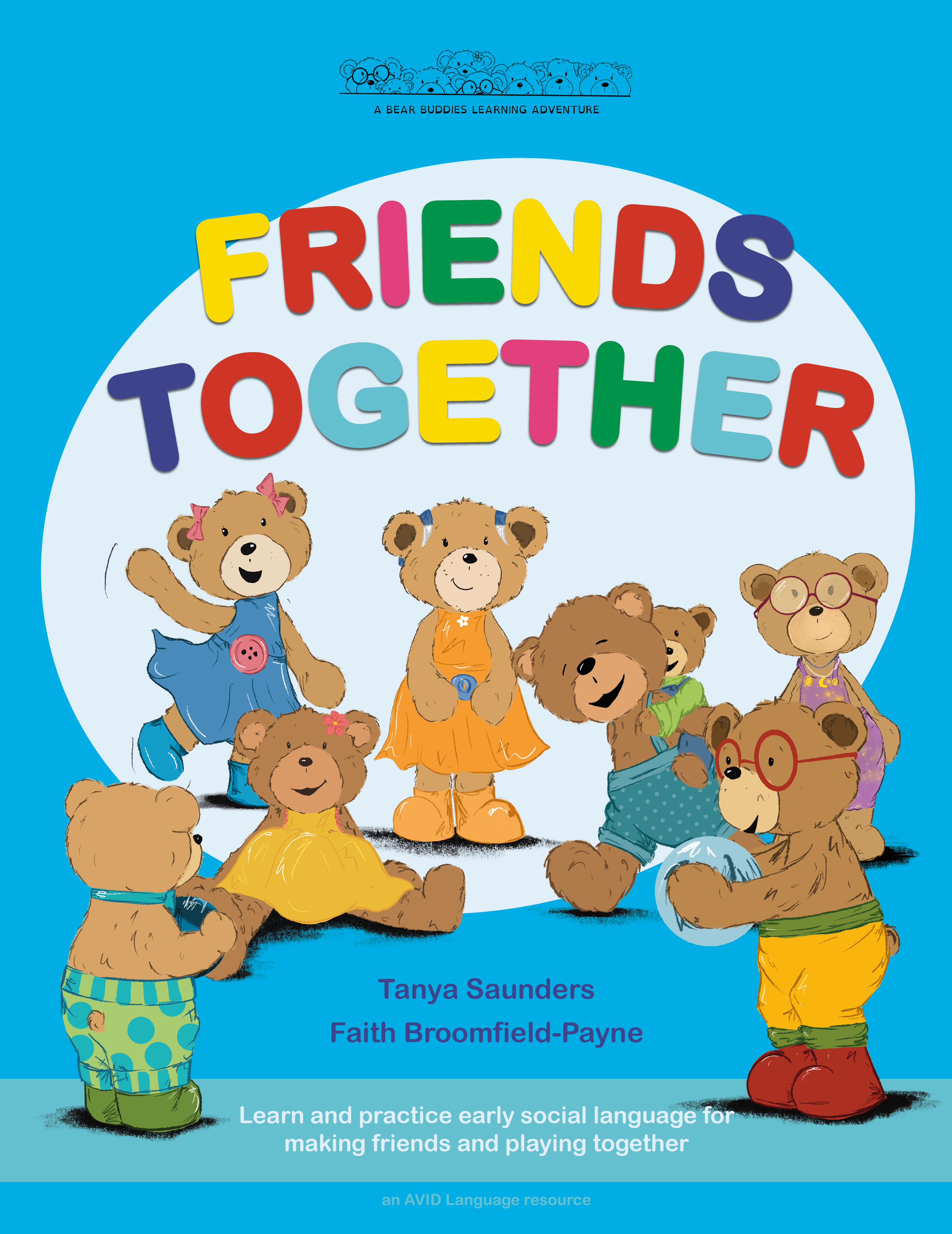UH-OH… PHEW! 3-in-1 Omnibus Edition
A Bear Buddies Learning Adventure Trilogy: 3 fun-filled social stories about helping others, helping yourself, and a cochlear implant lost and found! By Tanya Saunders
Book 1: A HELPING HAND
Oh no! Bobby Bear has hurt himself and needs help! What will the Bear Buddies do? How will they call for help and from whom? The story models some key vocabulary and simple language to use when asking for help, labelling different parts of the playground and describing what happened and why help is needed. When it arrives in the form of Miss Teacher Bear and a big medical box, we learn how playground bumps and scrapes are treated and discuss why it’s important to call for help from a grown-up.
Book 2: LOST AND FOUND
Another mishap! Onna Bear has lost one of her cochlear implants – it’s fallen off her ear and no-one can find it! Miss Teacher Bear devises a plan to search for the missing magic ear, with the entire Bear Buddies team lending a hand. The story demonstrates the importance of self-advocacy and asking for help when you need it while modelling key language and vocabulary to help children learn to help themselves.
Book 3: SUPERPOWERS!
Harry Bear simply cannot understand how Onna Bear’s cochlear implants stick to her head. Does she have mystical superpowers? As Onna Bear explains how her magic ears work, we learn some fascinating key facts about cochlear implants and why modern hearing technology is so amazing. Harry Bear wishes he had superpowers just like bionic Onna Bear, so Sala Bear reminds him that all the Bear Buddies do already possess special superpowers – the superpowers of friendship (and super-hula-powers too, but that’s another story!)
This trilogy contains 10 bonus Participation Pages, with fun, interactive activities to help children put their learning into practice, and encourage extended two-way communication between adult Reading Buddy and child.
Primary focus of the trilogy (themes/concepts):
Key vocabulary and simple language for asking for help for someone else
Key vocabulary and simple language for asking for help for yourself (self-advocating)
Fun facts and vocabulary about cochlear implant technology
Importance of helping others
Importance of self-advocacy and standing up for yourself, what you need, how you feel and what you believe
Importance of asking a grownup for help when the situation warrants it
Thinking and talking about stories you have read
Secondary focus of the trilogy (themes/concepts):
Understanding idioms (“a helping hand”)
School and playground vocabulary
Perseverance and never giving up
Expressing emotions and understanding how you feel
Learning that different words can have the same or similar meanings (synonyms)
Simple descriptive vocabulary, including opposites (sunlight/shade, heavy/light, etc)
Saying “thank you” / responding “you’re welcome”
Paying compliments
Key vocabulary and simple language for describing treatment for playground bumps and scrapes
Strengthening auditory memory
Developing theory of mind and emotional intelligence
Talking ahead and making plans
Sequencing (first…then…finally)
Using story maps to re-tell stories
Reading and interpreting a map or diagram
Time passing (in 5-minute increments)
Positional vocabulary (in, on, under, all around, near, inside, outside, etc)
Properties of different materials; what different things are made of and why
How magnets work
More from The Bear Buddies:
The Bear Buddies Learning Adventure Stories
With a central character, who is deaf and uses cochlear implants, The Bear Buddies learning adventure stories were originally conceived to support deaf children learning to listen and speak but are equally suited to all young children who need a little extra language practice. Focused on the transitional period when their world expands beyond the home to a school environment and other wider social settings, these charming, simple stories about a group of young friends navigating familiar childhood scenarios help children to learn and practice early social language, playground etiquette, self-advocacy and other skills that they will need in order to thrive at school, in the playground and on playdates in each other’s houses. Many of the books allude to specific challenges faced by deaf children but most of all, the books focus on building, repeating and practicing basic language and interpersonal skills needed by all children during this pivotal transition in their lives - the move from their home to their school and wider social interactions. Key themes of all the books include the importance of inclusivity, acceptance, diversity, kindness and friendships.
The author is grateful for the advice and support of the Auditory Verbal UK (AVUK) team.







